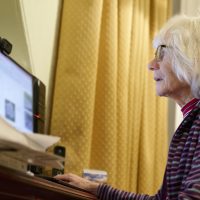Category: Season 10
Tags: Consumer, cooking, family, health, society
Kristina P. Brant, Ph.D., Extension Educator
Kristina Brant is an Assistant Professor of Rural Sociology at Penn State. She is a qualitative researcher who studies the family and community dimensions of substance use. Her work has been recognized by the American Sociological Association and the Rural Sociological Society, and it has been funded by multiple organizations including the National Science Foundation, the U.S. Department of Agriculture, and the Center for Rural Pennsylvania. She also works with Penn State Extension to put research into practice through community-based education and programming in rural Pennsylvanian communities.
Justine Lindemann, Ph.D., Extension Educator
Justine Lindemann is an Assistant Professor of Community Development and Resilience in Penn State University’s College of Agricultural Sciences. She has years of both domestic and international experience working on issues around community and economic development related to food system change.
The reduction of COVID-era benefits such as expanded SNAP payments, continued inflation, and rising food prices have put unprecedented pressure on older adults’ abilities to meet their household food needs. The emergency food network in Pennsylvania, which includes food banks, food pantries, and other local organizations that distribute food, has attempted to expand service delivery to meet these increased needs; however, crucial gaps in funding and food provisioning have widened. In this talk, we will draw on recent research to describe the work of the emergency food network in Pennsylvania, discuss increased food insecurity and the programs that work to address food needs among older adults, and provide more information on the relevance of these programs to listeners.
Additional Resources:
If you need to connect with resources in your community, but don’t know where to look, PA 211 is a great place to start. From help with a utilities bill, to housing assistance, after-school programs for kids, and more, you can dial 211 or text your zip code to 898-211 to talk with a resource specialist for free. Our specialists will listen to your needs and give you information on programs in your community that might be able to help.
The Supplemental Nutrition Assistance Program (SNAP) helps Pennsylvanians buy food. People in eligible low-income households can obtain more nutritious diets with SNAP increasing their food purchasing power at grocery stores and supermarkets. Those who are eligible receive an Electronic Benefits Transfer (EBT) ACCESS Card to make food purchases.
The United States Department of Agriculture, or USDA, makes commodity foods available to State Distributing Agencies. States provide the food to local agencies that directly serve the public (food banks, food pantries, soup kitchens, etc.). The local organizations distribute the food to eligible recipients for household consumption or use them to prepare and serve meals in a congregate setting. Recipients of food for home use must meet income and household eligibility criteria.
The Senior Food Box Program works to improve the health of low-income seniors by supplementing their diets with nutritious USDA Foods. In Pennsylvania, eligible participants include low-income individuals who are at least 60 years old and whose household income is at or below 130 percent of the U.S. poverty level.
The WIC Farmers Market Nutrition Program (FMNP) and Senior Farmers Market Nutrition Program (SFMNP) provide WIC recipients and low-income seniors with fresh, nutritious, unprepared, locally grown fruits, vegetables, and herbs from approved farmers in Pennsylvania.
Feeding Pennsylvania is the statewide association of nine Feeding America affiliated food banks. The mission of Feeding Pennsylvania is to promote and aid our member food banks in securing food and other resources to reduce hunger and food insecurity across the state and to provide a shared voice on the issues of hunger and food access within the Commonwealth of Pennsylvania.
Watch this video…












